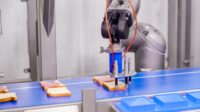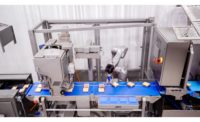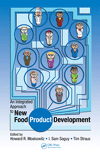 One of the hot topics in a panel discussion featured at the 2018 BEMA (Bakery Equipment Manufacturers & Allieds) Convention this year was addressing operational dynamics like how equipment can help meet ever-changing product development demands.
One of the hot topics in a panel discussion featured at the 2018 BEMA (Bakery Equipment Manufacturers & Allieds) Convention this year was addressing operational dynamics like how equipment can help meet ever-changing product development demands.
According to a BEMA review, “These demands can lead to changes on the production line that sometimes results in a ‘Frankenstein’ effect regarding equipment. The bakers on the panel challenged the equipment manufacturers in the audience to closely partner with them to overcome these operational difficulties.”
In response, equipment manufacturers are working with commercial bakeries and bakery goods processors to customize and more efficiently package a wide variety of dough products including pizza bases, flatbreads, pastry dough, cookie dough, pie tops, tortillas, empanada shells, and pasta sheets.
This involves using dedicated, high throughput interleavers as well as automated stacking and counting equipment that dramatically increase packaging speeds and production flexibility, while reducing labor cost.
Dedicated, high-speed interleavers
Interleavers are automated, high-speed machines designed to dispense sheets of wax paper or plastic film under food products for portion/inventory control and sanitary handling before final packaging. With such placement under dough products, bakery goods processors can also improve ease of preparation, separation, freeze release, shelf life, and package presentation.
In the production line, the interleaving process typically begins with the acceptance of sheeted dough products from a makeup line or cutting table, followed by paper or film being interleaved under the products. For some dough products like frozen pizza, packaging sometimes involves inserting a carrier board to provide enough rigidity to support the product.
The interleavers are increasingly combined with counter/stacking modules that automatically count and stack sheets of dough product for packaging. In many cases these counter/stackers are capable of loading the products directly into a case or presenting the finished stacks to the infeed of an automatic wrapper for final packaging.
Doubling production, cutting labor in half
One of the bottlenecks in production is the large amount of manual labor that is still utilized by many commercial bakeries or dough product manufacturers. Often, manual labor is utilized in processes such as dough product interleaving, counting, stacking, and packaging.
When Isaac Mazor, owner of Mazor’s Bakery, a New Jersey-based commercial producer of puffed pastry for homes and restaurants, sought to boost production to meet demand, the high cost of manual labor in production was a limiting factor.
“Manual labor was the problem,” says Mazor. “We had 12 people doing manual labor on our puffed pastry dough line, but were only producing 10 boxes an hour.” He says this involved manually interleaving, counting and stacking the dough product.
Mazor turned to Packaging Progressions, a company that specializes in the design and manufacture of automatic, high-speed interleavers and stackers, for help automating the production process.
Now after the puffed pastry dough exits a sheeting system which cuts the sheets into squares or rectangles, the pieces are fed to a ProLeaver 26300 interleaver, which puts wax paper under the sheets of dough. A ProStax 26 Shuttle then counts and stacks the dough.
The application dramatically cuts manual labor, while providing production flexibility. It allows Mazor’s Bakery to interleave and stack both long and short sheets of puffed pastry dough product with very little changeover.
“With the automation, we have doubled our production of puffed pastry dough product with half the manual labor,” says Mazor. “With six people, we are now producing about 20 boxes an hour, and are saving about $200,000 a year in labor costs.”
Reducing production costs by 20 percent
Empanada King, a commercial producer of empanada shells based in New Jersey, was ready to expand production, but could not due to the limitations of manual labor.
“After dough exited the feeder and rounding machine, it took 8 to 10 people to manually interleave the shells with paper, count, stack, and bag them,” says Marino Roa, owner of Empanada King. “Because the process was labor intensive, we could only produce about 4,000 shells an hour.”
Roa worked with Packaging Progressions to automate the process, utilizing an EV-9 Interleaver and Stacker. The combination cuts wax paper from roll stock, inserts it under each empanada shell, counts the shells, and stacks them to the desired count.
The interleaver and stacker can interface with virtually any upstream dough sheeters or downstream packaging equipment, and work well with any product between 3” x 3” and 9” x 9” including items like empanada shells, pot-pie tops, pasta sheets, or cookie dough.
“Now we are producing 9,000 shells an hour with two people, and have the capacity to produce about 12,000 shells an hour without adding more labor,” says Roa.
He appreciates how the programmable equipment can adjust to production changes.
“We have a customer that requires empanada shells without paper interleaving, and that is easy to accommodate because you can program it any way you want it,” he says.
Compared to the pre-cut interleaving paper used previously, Roa estimates that the roll stock is about 40% less expensive in material cost.
He also appreciates how the roll stock interleave paper accommodates his current 5” and 6” shells, and will accommodate an 8” size he plans to introduce.
“The automated interleaver and stacker have reduced our cost of production by over 20%,” says Roa. “We got our ROI in a year. So far the equipment has worked flawlessly.”
High-speed pizza production
When it comes to sheer dough volume, pizza is number one in the dough industry. With the world pizza market at $128 billion last year, producing pizza bases must be high-speed in order to achieve sufficient volume.
Higher speed production was required when a pizza producer with 52 pizzerias located in Ohio and northern Kentucky sought faster throughput for a complementary business co-packing sheeted, frozen pizza crusts for commercial clients. The challenge, however, was that manually placing sheets of wax paper between crusts was slow and labor-intensive.
In order to automate the process and increase output, the company installed two ProLeaver interleaver/stacker systems from Packaging Progressions.
Together, the systems can automatically interleave, count and stack pizza crusts at rates up to 1,100 per hour per lane.
To achieve these kinds of speeds and maximize uptime, automatic interleavers vary from standard industry offerings with unique features such as servo controlled product and paper synchronization; power-assisted paper unwinds; enhanced sensing and positioning for precise placement and staging conveyors to properly space the product prior to interleaving.
With such equipment, interleaved pizza bases can be conveyed to modular auto stackers for hands-free counting and auto stacking before introduction to a packaging or wrapping machine. Additional line flexibility can be gained with a bypass option. This can accommodate the processing of non-interleaved or non-stacked product without taking the interleaver or stacker out of the line.
According to the pizza producer’s plant manager, the Packaging Progressions’ systems have increased production speed by about 20 percent with one-third fewer workers.
As dough product professionals look for ways to more flexibly and cost efficiently meet demand, the ability to introduce high speed interleavers into their production process can help them do so while significantly decreasing labor cost to become more profitable.
About Packaging Progressions:
For more information about interleavers from Packaging Progressions: call (610) 489-8601 ext 207; email sales@pacproinc.com; visit www.pacproinc.com; or write to Packaging Progressions, Inc., 261 Schoolhouse Road, Suite 7, Souderton, PA 18964.










